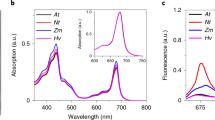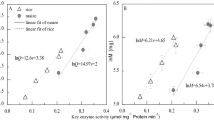Abstract
ULTRACENTRIFUGED analyses by Wildman and co-workers1,2 of cytoplasmic protein of leaf cells of a number of higher plants, extracted by mechanical disruption of cells into buffer, have revealed two major fractions: the first a homogeneous component of sedimentation constant (S 20) 16–18 Svedberg units (fraction 1) and the second a polydisperse component with mean S 20 of 3–4 units (fraction II).
This is a preview of subscription content, access via your institution
Access options
Subscribe to this journal
Receive 51 print issues and online access
$199.00 per year
only $3.90 per issue
Buy this article
- Purchase on Springer Link
- Instant access to full article PDF
Prices may be subject to local taxes which are calculated during checkout
Similar content being viewed by others
References
Singer, S. J., Eggman, L., Campbell, J. M., and Wildman, S. G., J. Biol. Chem., 197, 244 (1952).
Eggman, L., Singer, S. J., and Wildman, S. G., J. Biol. Chem., 205, 969 (1953).
Lyttleton, J., Biochem. J. (in the press).
Wildman, S. G., and Jagendorf, A., Ann. Rev. Plant Physiol., 3, 131 (1952).
Author information
Authors and Affiliations
Rights and permissions
About this article
Cite this article
LYTTLETON, J. Relationship between Photosynthesis and a Homogeneous Protein Component of Plant Cytoplasm. Nature 177, 283–284 (1956). https://doi.org/10.1038/177283b0
Issue Date:
DOI: https://doi.org/10.1038/177283b0
This article is cited by
-
Some Properties of Extracted Protochlorophyll Holochrome
Nature (1956)
Comments
By submitting a comment you agree to abide by our Terms and Community Guidelines. If you find something abusive or that does not comply with our terms or guidelines please flag it as inappropriate.



